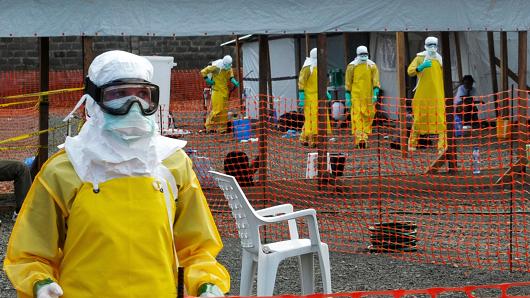 The World Bank pledged Thursday to provide an additional $100 million to support the deployment of more health workers to the three African countries at the epicenter of the Ebola outbreak. The money, which brings the World Bank’s total pledges to more than $500 million, comes in response to a series of urgent appeals for more international assistance in Ebola-stricken West Africa.
The World Bank pledged Thursday to provide an additional $100 million to support the deployment of more health workers to the three African countries at the epicenter of the Ebola outbreak. The money, which brings the World Bank’s total pledges to more than $500 million, comes in response to a series of urgent appeals for more international assistance in Ebola-stricken West Africa.
According to the latest figures from the World Health Organization (WHO), nearly 14,000 cases of Ebola have been confirmed in the current outbreak, which began in the dense forests of southwestern Guinea early last year and quickly spread into neighboring Liberia and Sierra Leone. Just three months into the outbreak, international aid organization Doctors Without Borders issued a dire assessment of the situation on the ground, warning that the outbreak “is totally out of control” and would not be stopped without a significant influx of resources and trained personnel.
Despite these early warnings, the global community has been slow to respond to the crisis. Seven months after the first cases were confirmed, the virus has now spread to Senegal, Nigeria, Mali, Spain and the United States, and experts say the risk of further international spread will persist until the outbreak is stopped at its source. While f0reign aid commitments have picked up over the past several weeks, there remains a dangerous shortage of critical resources including ambulances, treatment beds and, most importantly, personnel.
“The world’s response to the Ebola crisis has increased significantly in recent weeks, but we still have a huge gap in getting enough trained health workers to the areas with the highest infection rates,” World Bank Group President Jim Yong Kim said in a news release. “We must urgently find ways to break any barriers to the deployment of more health workers. It is our hope that this $100 million can help be a catalyst for a rapid surge of health workers to the communities in dire need.”
The WHO estimates that an additional 5,000 international medical and support personnel are needed to effectively fight the outbreak in the three hardest-hit countries. But as more U.S. states enact mandatory quarantines on returning health workers, there is grave concern that the medically unnecessary restrictions will dissuade volunteers from going to West Africa.
“Decisions (on quarantine) should be based on science and fact — not hype and hysteria,” Anthony Banbury, head of the U.N. Ebola Emergency Response Mission, said last week. “Anything that will dissuade foreign trained personnel from coming here to West Africa and joining us on the frontline to fight the fight would be very, very unfortunate.”
The World Bank has warned that if the epidemic continues unchecked, the financial toll to the region could hit $32.6 billion by the end of 2015. With the geographical range of the outbreak still expanding, there are growing fears that Ebola could reach Ivory Coast or Ghana, the region’s economic powerhouses. Even elsewhere in Africa, the ripple effects of the outbreak are apparent: last week, the International Monetary Fund cut its forecast for economic growth in sub-Saharan Africa this year to 5 percent from 5.5 percent, due in part to “economic spillovers starting to materialize” from the outbreak.
There has been a bit of encouraging news in recent days, however: WHO officials said Wednesday that there is some indication that the rate of transmission may be slowing in Liberia. Dr. Bruce Aylward, WHO’s assistant director general, noted a decline in the number of burials in Liberia and said he is “cautiously optimistic” that the global push to tame the epidemic may be making some progress. However, h e cautioned against assuming that Ebola was coming under control there or in any of the three countries most affected by the disease: “Getting a slight decrease in the number of cases on a day-to-day basis versus getting this thing closed out is a completely different ball game.”
Meanwhile, health officials in Sierra Leone said late Wednesday that the country remains “in a crisis situation which is going to get worse,” the Associated Press reported. The outbreak recently reached the last unaffected district in Sierra Leone, where up to 120 deaths have been recorded each day in some of the worst-hit ares. And in neighboring Guinea, where the outbreak emerged, Ebola cases “continue to explode,” according to the latest situation assessment from the WHO.
